The inclusive mindset learning pathway – increase true awareness, empathy, and belonging | Best Practice by PwC
Would you like to know how your current and future leaders can develop an inclusive mindset? To understand how they can acquire the key human skills needed to achieve this? Inclusive leadership is something that can be taught. Come along on the learning journey and follow PwC’s Inclusive Mindset Pathway.
This Best Practice was first published in the Gender Intelligence Report 2022.
Last year, we successfully launched ‘The New Equation’, our revised global strategy in response to major changes in the world and the ongoing impact of the Covid-19 crisis. To fulfill our commitment to build trust in society and deliver sustainable outcomes, we envision a future that is human-led and tech-powered. Our people, our diverse community of problem solvers, are key to delivering on our strategy and commitment.
The business case for diversity and inclusion is clear: diverse and inclusive organizations attract and retain talent and are higher performing and more innovative. As a recent PwC global workforce study confirms, the great resignation is real. According to the survey, skilled workers are ready to test the market. One in five said they are extremely or very likely to change employer in the next 12 months.
Clearly, retaining and attracting employees requires more than just pay. Job fulfillment and the ability to be one’s true self at work rank second and third, respectively, among employees considering a job change. Meaning is important to both male and female employees, although the survey also found that women are less likely to feel included and listened to by their managers. For this reason, on the back of our business strategy, we have also renewed our I&D strategy as an important enabler for The New Equation. The ‘Inclusive Mindset Learning Pathway’ is a crucial step we are taking to actively develop an inclusive mindset for our people.
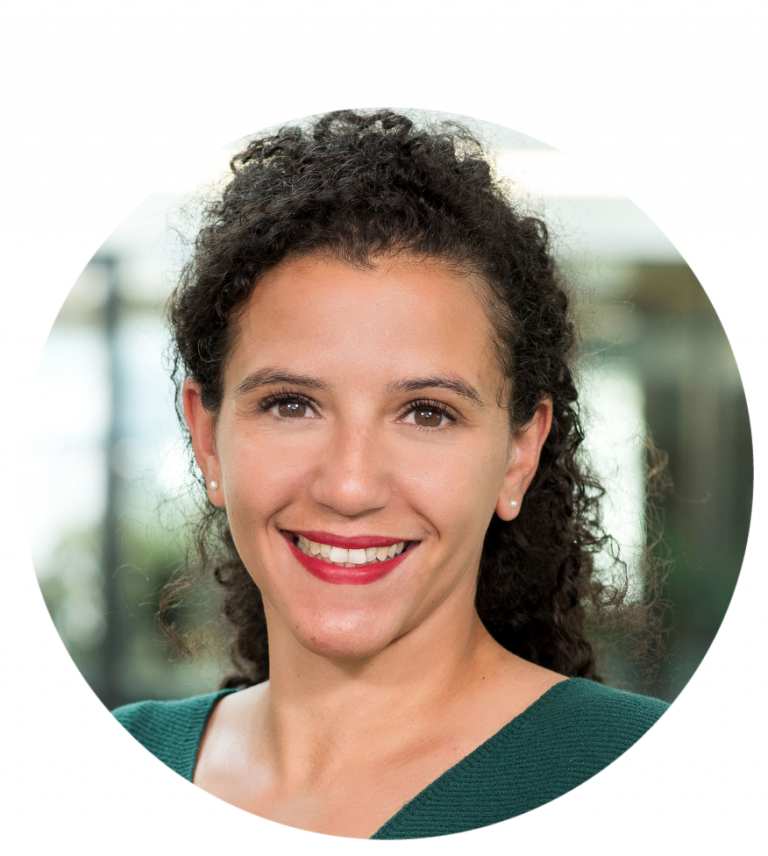
Senior Manager
People & Organisation at PwC
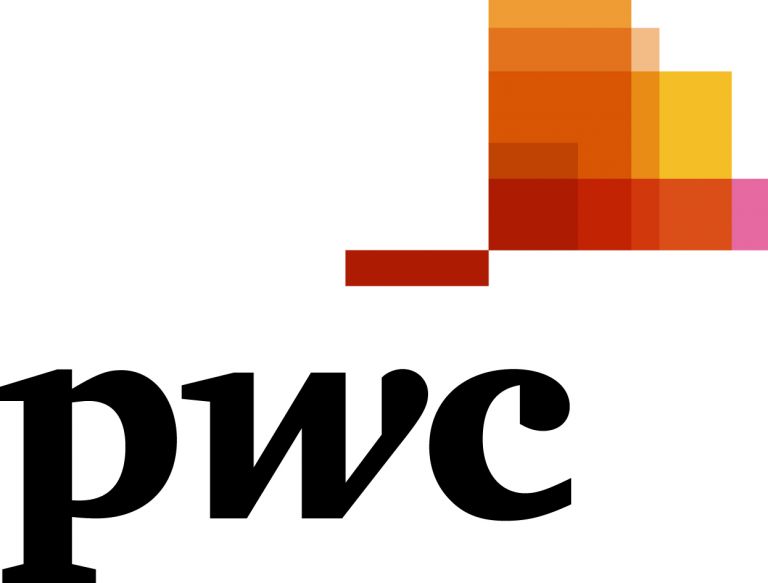
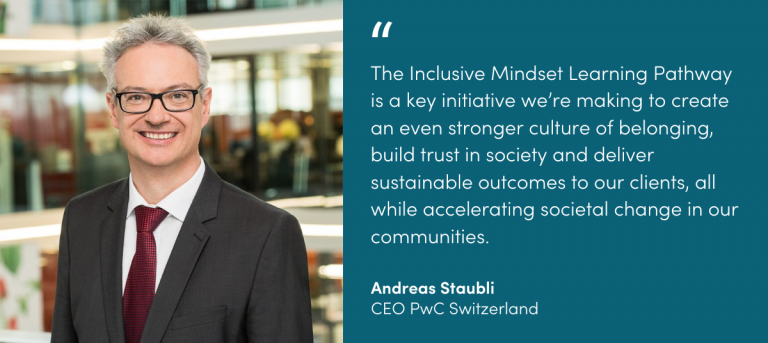
As Andreas Staubli explains, “Today’s challenges are unlike any we’ve experienced before. They require something more than the expected. We need and we want to have diverse and inclusive talent and leaders who can inspire, innovate and support our varied client base in this shifting world. The Inclusive Mindset Learning Pathway is a key initiative we’re making to create an even stronger culture of belonging, build trust in society and deliver sustainable outcomes to our clients, all while accelerating societal change in our communities. Essentially, the learning helps us to be more intentional about diversity and inclusion and build relationships with more curiosity, empathy, authenticity and humility.”
The Inclusive Mindset Learning Pathway provides a comprehensive learning experience that combines a variety of learning content: from videos (e.g., TED-Talks), to articles (e.g., from Business schools) to simulations.
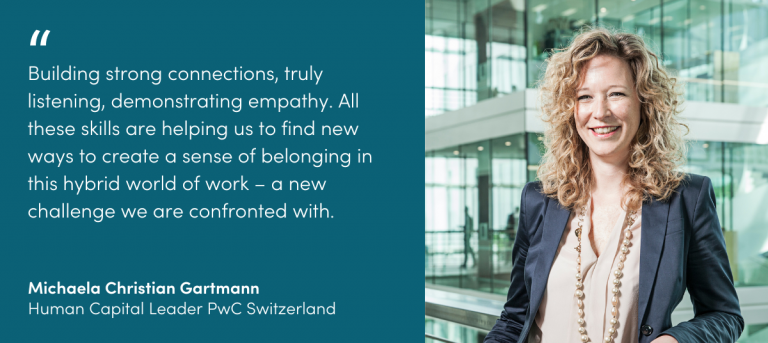
Self-paced learning allows learners to build the foundations for an inclusive mindset by understanding essential inclusion concepts, self-reflecting on them, and sharing with others to practice. The pathway covers topics such as unconscious bias, systemic advantage, micro-inequities, as well as emotional intelligence, humility and curiosity and allyship.
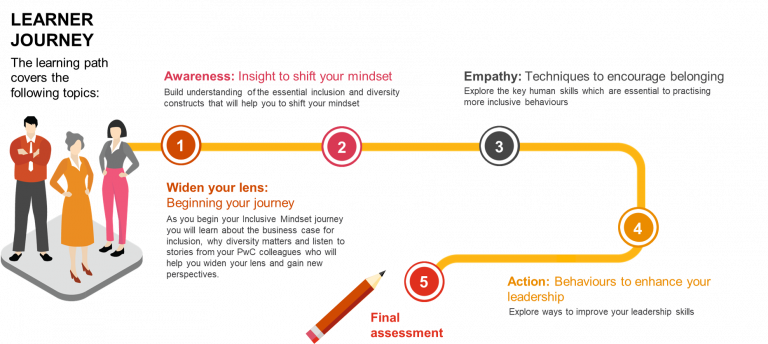
The entire pathway takes about 10 hours to complete. We have incorporated a gamified element into our initiative: Upon completion, participants receive a virtual Inclusive Mindset Badge that they can wear ‘visibly’, for example on their LinkedIn profile. In this way, we want to reward the motivation of our employees and recognize their time, effort and acquired skills. “The Inclusive Mindset Badge is our first human upskilling badge which equips us to empower our diverse people by building strong connections, truly listening, demonstrating empathy and supporting them to perform optimally in their further growth and development”, says Michaela Christian Gartmann, Human Capital Leader.
As of this year, the completion of the curriculum is a promotion requirement for all employees with a people management function. Our leaders have committed to setting a good example and completing the badge before the deadline.
As measuring the progress of our DE&I efforts is vital, see the D&I Dashboard Best Practice of 2020, we track both completion rates and the status of those who have started learning but have not yet completed it. Rates are tracked across services and grades to support our communication activities. Results are also communicated monthly to the respective leadership teams and in a more transparent manner to all employees near the end of the deadline for completion.
To ensure a sustainable learning experience, we embed learning into our existing learning and development offerings for all managers and above. We are also integrating parts of the learning pathway into skills and future leaders’ curricula targeted at junior staff.
We know from the pilot that the content requires a lot of time for self-reflection. Depending on work priorities, it can also be challenging to make the time to learn. To sustain the learning benefits, we have scheduled guided learning months in which we divide the learning pathway into thematic blocks and accompany the participants with communication, tips and a weekly check-in where leaders can discuss how they intend to incorporate what they have learned into their everyday work. “What I personally valued is that the learning introduces and explains inclusion terminology to enable us to speak consistently and with confidence about the value and complexity of inclusive leadership, inside and outside of PwC“, states Marc Secretan, Assurance and Diversity Partner.
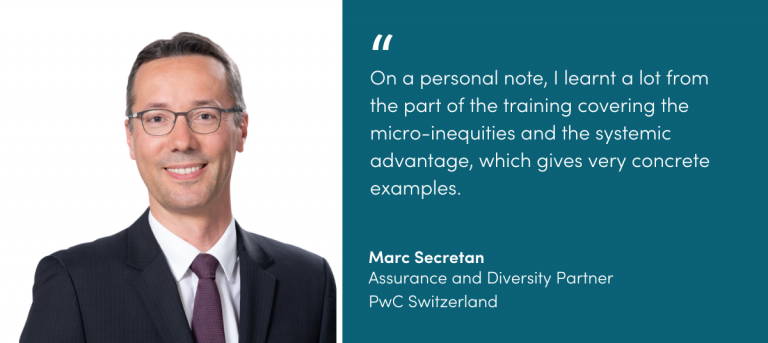
We plan to launch a second badge over the coming year that will focus on inclusive leadership skills – encouraging accountability from what was learnt in the learning pathway. We are convinced that the current and future learning initiatives will enable our employees to be more aware of inclusion and help them thrive both professionally and personally, fostering belonging in the workplace while making a positive impact on society.
Jasmin Danzeisen kindly makes herself available for an exchange to interested Advance member companies. Feel free to contact her at jasmin.danzeisen@pwc.ch.
Further reading:
PwC’s Global Workforce Hopes and Fears Survey 2022: What 52,000 people think about work today.
This Best Practice was first published in the Gender Intelligence Report 2022.

ABB Switzerland is transitioning from traditional “Disability Management” to a strength-based “Ability Management” approach in health promotion. The company aims to significantly reduce absenteeism. Related targets will be integrated into leadership performance assessments. Through initiatives like the Icebreaker campaign, which encourages open dialogue about mental health challenges, ABB has already achieved measurable improvements in psychological safety and employees’ sense of belonging.

Swiss Re launched the Career Returnees initiative in July 2024 to tap into the underutilized talent pool of professionals returning to work after career breaks, recognizing that traditional recruitment often overlooks this experienced group. The program is built on four pillars: open positions for returnees, equal pay for equal work, development opportunities and flexible work options, with explicit career returnee advertising, internal awareness and a manager support toolkit, and external outreach campaigns. Since launch, the initiative has welcomed over 62 employees across 12 countries, with 92% onboarding satisfaction and 82% upskilling satisfaction, demonstrating that career breaks occur across all genders and career stages while returnees integrate quickly and deliver effectively.

dsm-firmenich launched the Mental Fitness Champions (MFC) initiative following a merger to support employee well-being during organizational transformation, training colleagues to listen to and support peers. The Global Vitality Office partnered with HSE Global to deliver a customized 7-hour peer support program based on a Canadian Armed Forces framework, training internal instructors and offering courses in six languages across 36 countries. Since launching in April 2024, the initiative has engaged 500+ colleagues in 60+ courses, with 95 certified champions in Switzerland alone, creating a peer-support network that promotes psychological safety, reduces mental health stigma, and fosters an inclusive workplace culture.
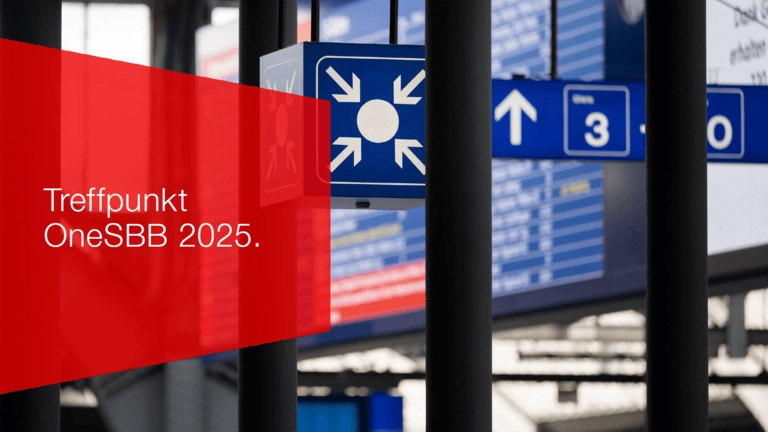
SBB established "OneSBB Meeting Points" as leadership dialogues focusing on "Value Diversity Respectfully," where around 1,000 leaders voluntarily participate in groups of 30 to discuss diversity, unconscious biases, and inclusion through peer-to-peer learning. The initiative runs from April to October 2025, featuring discussions led by top executives covering individual perspectives (bias awareness), team perspectives (case studies), and organizational benefits of diversity and inclusion. The program aims to enhance leaders' reflective abilities, foster empathy, reduce discrimination, and develop skills in conflict resolution and leading diverse teams, with outcomes evaluated through participant feedback.

Alpiq launched a leadership transformation program centered on "Secure Base Leadership" to drive cultural change in the volatile global energy market, where culture serves as a key competitive advantage. Starting with the Executive Board and cascading through the organization, the program focuses on Care, Dare, and Share philosophy, training internal ambassadors as IMD-certified coaches to foster inclusive leadership, psychological safety, and diverse perspectives. The initiative has already trained one-third of Alpiq's workforce, resulting in significant improvements including NPS scores rising from +1 in 2022 to +42 by 2024, Great Place to Work certification across all locations, and inclusivity questions ranking in the top 5 survey results.
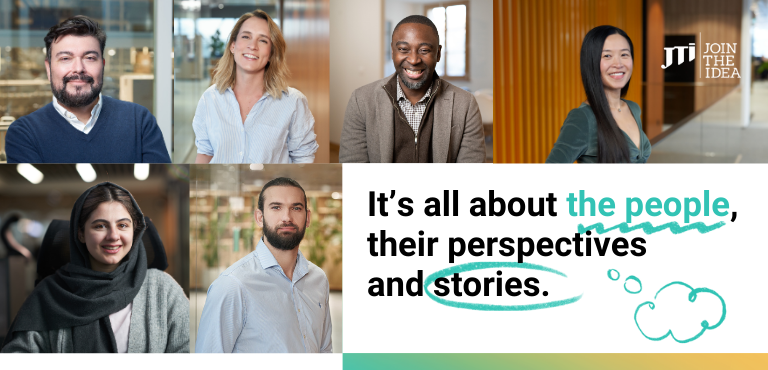
As a global organization, JTI had established several policies to support the DEI agenda and were in the process of being certified by the EY Global Equality Standard. However, they recognized the need for a more localized implementation that met the specific needs of the organization at the time. By focusing on inclusion, raising awareness around bias, and introducing initiatives like the Virtual Reality „Men in Business – In the Body of a Woman“ experience, they have started to see positive changes in conversations, employee engagement, and inclusive management across the organization.
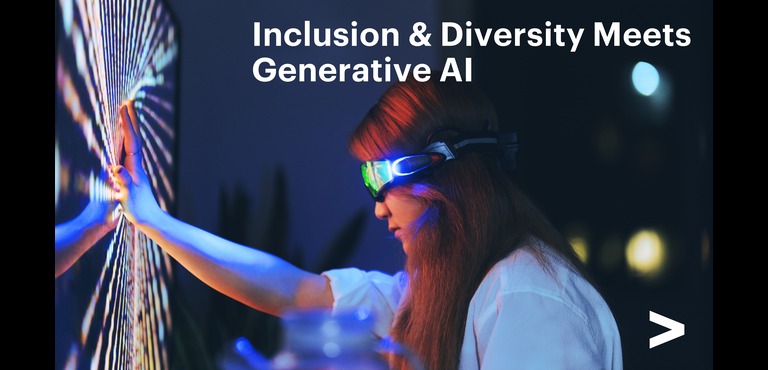
Generative AI (GenAI) is becoming increasingly integrated into our daily work, but with its use comes exposure to inherent biases. To address this, Accenture brought together experts from GenAI and inclusion to discuss these issues, focusing on promoting inclusivity through thought leadership and responsible AI frameworks. This collaborative approach aims to ensure GenAI is used responsibly and fairly, leveraging progressive governance to adapt to rapidly evolving technology.
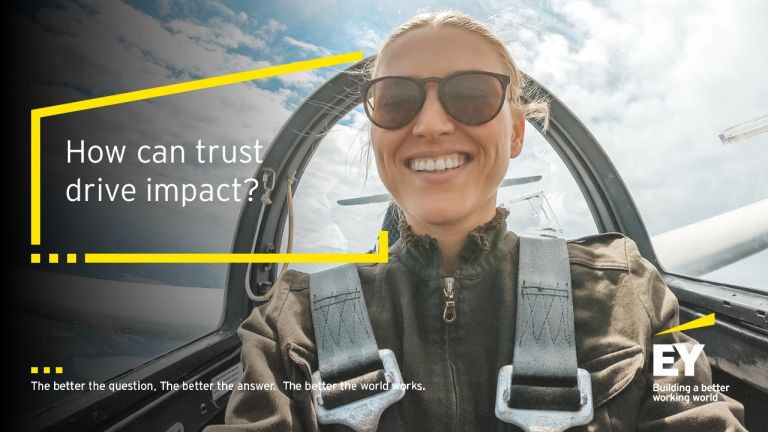
If CEOs are value-driven they make Diversity, Equity, and Inclusion a strategic focus area. By trusting and supporting their leaders to authentically champion these initiatives, the organization is able to foster a positive culture, improve performance, and achieve success.
When leaders are empowered to pursue their beliefs and values, they can lead with authenticity, integrity, and purpose, resulting in positive impacts on the organization.

Learn how Swiss Re is enabling leaders to incorporate inclusion into daily practice and to foster an inclusive environment where everyone feels valued.

Unlock financial savviness with Zurich Insurance as they empower women to enhance their financial knowledge and skills. Explore the WIN Financial Awareness Program, fostering a supportive community and providing personalized services to boost financial confidence.
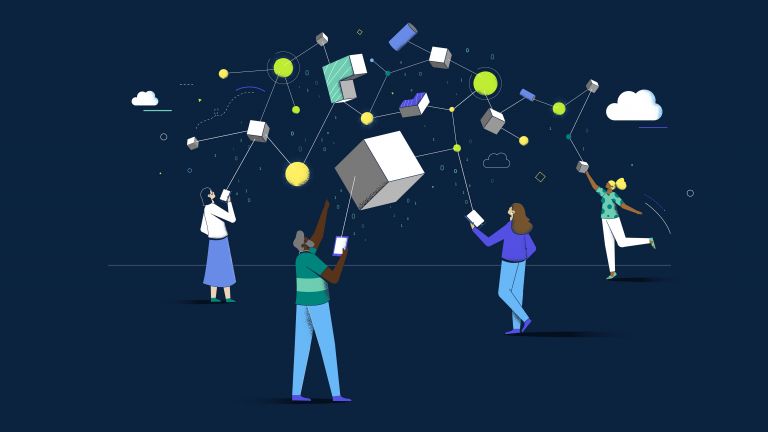
Involving employees pays off - learn what happens when the entire workforce sets the agenda for gender parity.
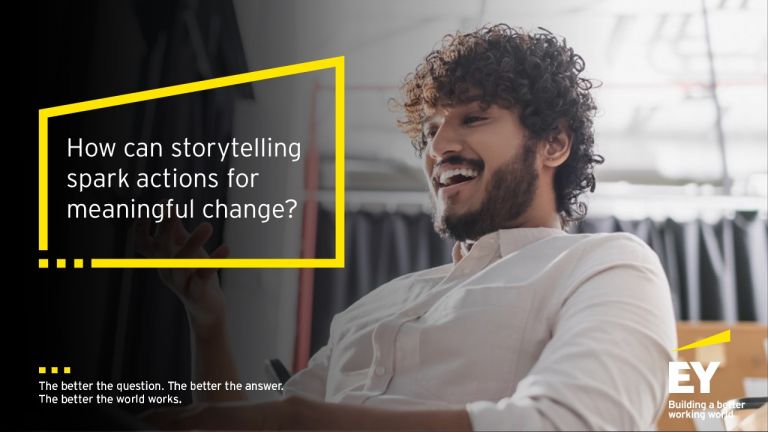
From storytelling to a real culture shift - learn how to use an impactful tool to change leadership behavior.